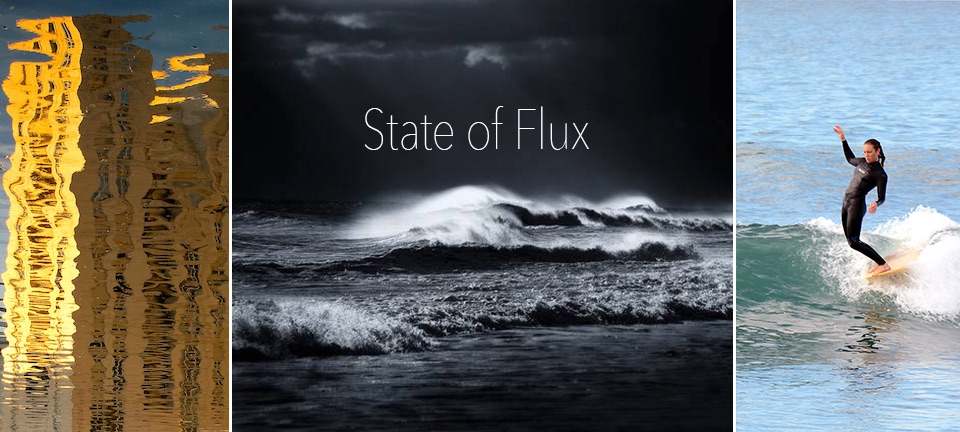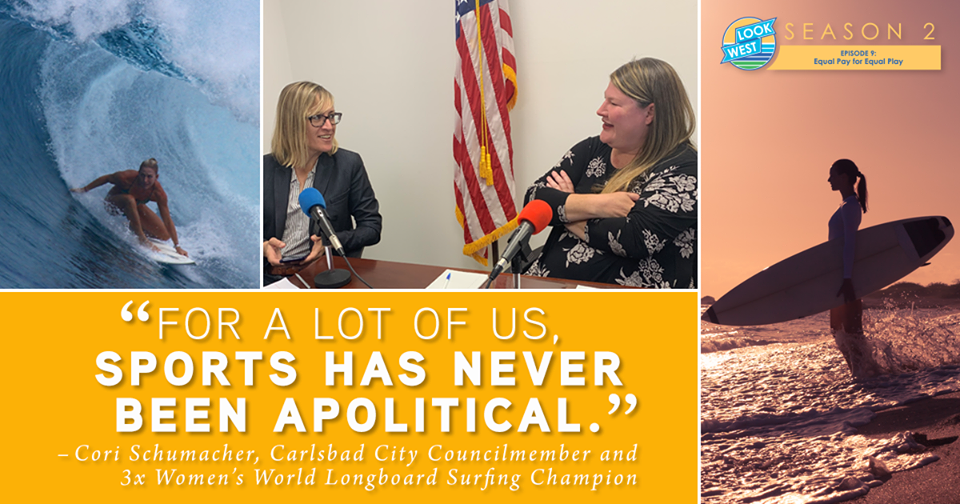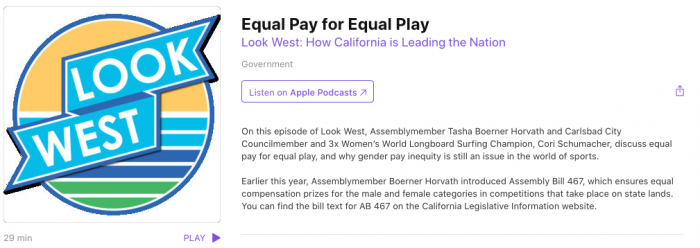Surfing Formulations: Emerging from the Apolitical
Written by Cori, Posted in Politics, Surfeminism
Surfing Formulations: Emerging from the Apolitical
The following is an excerpt from a keynote talk I presented at San Diego State University for the “Impact Zones and Liminal Spaces” conference in April of 2019. The SDSU talk intended to build upon and fill out the seminal theoretical work I authored in The Critical Surf Studies Reader (Ch. 13, “My Mother is a Fish”), published by Duke University. This is a part of the complete work that I will be publishing in the near future.
The excerpt is followed by a podcast on the most visible, political application of this work to date. I am deeply grateful to Assemblymember Tasha Boerner Horvath for her involvement in carrying the legislative thread of this effort forward in the state of California.
The work continues, both in explicit output alongside the powerful surfing imaginaries emerging in academia and surf culture (theoretical), and the application of the underlying theoretical framework I have crafted, in the political spaces within which I am currently embedded (praxis).
_____
“Ironically, although there has been a tremendous outpouring of scholarship on ‘the body’ in the last twenty years, nearly all of the work in this area has been confined to the analysis of discourses about the body” (Alaimo). The result of privileging the discursive over practical reality, 1) relegates academic theory to the periphery of political spaces, 2) renders novel subjectivities politically impotent signifiers in identity-politics platforms dead on arrival in the current post-postmodern era.
This means institutionalized hierarchies, and the nodes of privilege and flows of power, remain intact in the very spaces from which we need to deploy generative political action in order to change our self-destructive trajectory. In other words, postmodern theories cannot infuse political spaces, congeal in praxis, then emerge, focused and effective, for the important work in front of us. In addition, political spaces themselves are in transition and postmodern political subjectivities are not yet equipped for the necessary work of recombining, rearticulating, and redefining political spaces for the 21st century.
At its core, the work I am presenting today is a disruptive intervention meant for these very spaces [academia] where language is so often disrobed, eviscerated, and segregated to the exclusion of praxis.
This work is intended as both wayfinding and whirlpool. As wayfinding, it points toward and through a channel, or rupture, exposed by the tumultuous, all-encompassing socio-political impact zone of our times. As whirlpool, it draws in the depths and from the peripheries, the liminal spaces of emerging posthumanist theoretical works that call for imaginaries that release political spaces and political subjectivities from postmodernism’s discursive loops. Spitting, spewing, foaming forth from the organic forces… the profile of a co-emergent political subjectivity springs forth, one that can be effectively and subversively deployed, through and against, the anthropogenic assault on our climate that is ideologically, culturally, and materially driven.
© C. Schumacher, 2019
_____
A personal note: This important piece of legislation emerged from and through surfing and non-traditional sporting spaces, very intentionally. It’s difficult for me to let this moment pass without a brief retrospective. When I emerged as a political voice in surfing, I was not new to political activism or to gender equity advocacy. I had 10 years worth of experience under my belt in community organizing, critical media interaction, and socio-political transformation research. Each step I have taken, from boycotting the first professional surfing contest in China and the world surf tour, to the 2013 Roxy Change.org petition has been deeply thought out and strategically iterative.
In theorizing a novel political subjectivity in conversation with the first women who participated in the Institute for Women Surfers (IWS) in 2014, I had no idea that I would be walking into political spaces as an elected official in 2016. I decided to take a sabbatical in 2015 to reassess the kind of work I would invest my time and attention to moving forward.
At the end of this time, I concluded that I no longer wanted to be in a space where I watched the media/surf industry/surf contests and commented, driven by what the surf industry did in a reactive mode. Instead, I wanted to enter into a more generative, creative mode, where solutions are theorized, crafted, and implemented, and I wanted to create these spaces for others. Then the call to public service came. This has been such an incredible experience.
I am still in a space of solutions and creative problem-solving. There are so many more people who remain invested in criticism and reaction, but I have found some solid allies and I cherish these folks daily. There is something to be said about the focus and efficacy brought by being a political subjectivity, rather than a political identity, something that is a key distinguishing point in my thinking. If you happen upon me these days, you might hear me talking about what it feels like to be a political object and objet petit a.
Thanks for being a part of this journey so far!
“It is not the critic who counts; not the man who points out how the strong man stumbles, or where the doer of deeds could have done them better. The credit belongs to the man who is actually in the arena, whose face is marred by dust and sweat and blood; who strives valiantly; who errs, who comes short again and again, because there is no effort without error and shortcoming; but who does actually strive to do the deeds; who knows great enthusiasms, the great devotions; who spends himself in a worthy cause; who at the best knows in the end the triumph of high achievement, and who at the worst, if he fails, at least fails while daring greatly, so that his place shall never be with those cold and timid souls who neither know victory nor defeat.” -T. Roosevelt
Click the image below to listen to a podcast Assemblymember Tasha Boerner Horvath and I did recently on California’s AB 467, the “Equal Pay for Equal Play” bill that is the first significant piece of legislation in the United States to impact the equity space in sports since Title IX.


